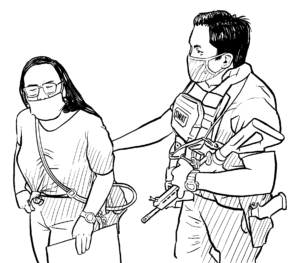Cutting wages in the time of a pandemic

In cahoots with the Department of Labor and Employment (DOLE), capitalists got away with slashing wages under the guise of “preserving jobs.” They exploited the workers’ desperation to hang on to their jobs in the midst of destructive lockdowns and absence of state aid.
Big companies took advantage of the conditions borne out of restrictive and prolonged lockdowns to further depress already low wages. Many workers from small businesses were also forced to accept wage cuts so they can keep their jobs.
This was confirmed by the Philippine Statistics Authority. In its Occupational Wages Survey, wages dropped an average of 9% in 2020. The average monthly wage of ₱18,108 in 2018 dropped to ₱16,486 in August 2020. Workers in finance and insurance, real estate and wholesale and retail trade were among those who suffered the steepest drop.
Wages moved further away from the decent wage of ₱1,051/day or ₱31,530/month.
The DOLE provided the legal basis for capitalists to brazenly violate the law through issuing an advisory on May 18, 2020. The agency allowed them to slash wages and wage benefits so long as workers “agreed.”
The DOLE pushed for work-from-home arrangements which slashed work hours and days while dumping more work on the workers which obligated them to work beyond 8-hour days. The agency also allowed arbitrary layoffs. It rescinded the advisory on September 2020, after five months of workers’ objections.
Workers have long fought for a just increase in wages. The last meager wage increase in the National Capital Region was in 2018. Workers petitioned for a wage increase in 2019, after the DOLE threw the first one out. The agency refused to deliberate the petition which was based on the skyrocketing prices of basic goods and services. In the meantime, the bill for a national minimum wage is still languishing in Congress.
Meanwhile, millions of workers who lost their jobs have not been able to return to their former status. Capitalists replaced regular jobs lost during the pandemic with temporary and contractual work. According to Ibon Foundation’s estimates, most work (95%) created during the pandemic are part-time. A large part is in the informal sector. Less than 1% are regular jobs.
According to the group, around 5.7 million Filipinos are jobless, and not 3.2 million as reported by government statistics. This is because the government exclude in their count those who have lost hope in finding work.
All these mean lower pay, loss of benefits, job insecurity and suppressed workers’ rights such as the right to form a union. On the other hand, big companies are marking “historic” highs in terms of income and revenue. They have more than recouped their losses incurred when the pandemic first hit. In 2021, the 50 richest bourgeois compradors increased their wealth by 30.5%. Among them are Manuel Villar, Enrique Razon and Dennis Uy, Rodrigo Duterte’s favored allies.



